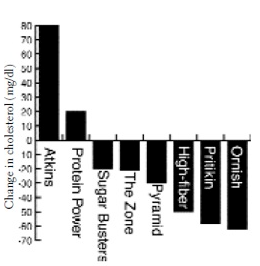Popular Diets and Cholesterol
 A recent review article examined the likely impact of some of the more popular weight reducing diets on serum cholesterol. This study used a computer diet analysis of typical 7 day meal plans from Dr. Atkins’ New Diet Revolution, Protein Power, Sugar Busters, the Zone Diet, the Pritikin Diet, the Ornish Diet, the Pyramid Diet and a High-Fiber Diet. The authors then used the sum of 3 scientifically established formulas which predict the likely change in serum cholesterol level based on changes in dietary intake of fiber, fat and cholesterol that would result from switching from an average American diet to each of these 7 diet plans.1
A recent review article examined the likely impact of some of the more popular weight reducing diets on serum cholesterol. This study used a computer diet analysis of typical 7 day meal plans from Dr. Atkins’ New Diet Revolution, Protein Power, Sugar Busters, the Zone Diet, the Pritikin Diet, the Ornish Diet, the Pyramid Diet and a High-Fiber Diet. The authors then used the sum of 3 scientifically established formulas which predict the likely change in serum cholesterol level based on changes in dietary intake of fiber, fat and cholesterol that would result from switching from an average American diet to each of these 7 diet plans.1The authors of this review also point out that diets consisting largely of minimally processed plant foods high in carbohydrate are likely to reduce insulin resistance and the risk of diabetes and also reduce the risk of many types of cancer. This study showed that the “Zone Diet” and the “Sugar Busters Diet” would lower serum cholesterol compared to a typical American diet because of their lower saturated fat content. Nevertheless, they concluded that “Higher carbohydrate, higher fiber, lower fat diets would have the greatest effect in decreasing serum cholesterol concentrations and, thus, the risk of CHD.”Figure 1 - calculated change in cholesterol from weight loss diets compared to American diet:By Dr. James J Kenney, PhD, FACNReferences:1. J Am Coll Nutr 2000; 19:578-90


